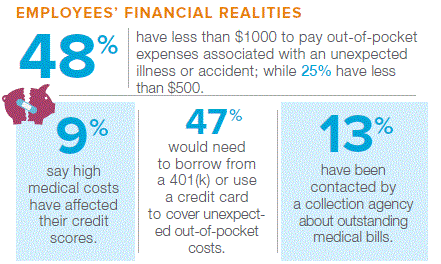HSAs Gain Steam in 2016: Six Reasons Why Organizations Should Embrace HSAs
Jim Lynch, Chief Sales Officer and Head of Healthcare Product Strategy
October 14, 2015 - Benefitfocus
Herefs the stark reality: most of your employees are not financially prepared to handle unexpected medical expenses – whether today or during retirement. A survey by AFLAC found that 49 percent of employees have less than $1,000 to pay for out-of-pocket expenses associated with a serious illnesses or accident and 53 percent would have to borrow from their 401(k)s or use a credit card to cover the costs of such events.
As an employer, youfre facing a myriad of challenges as well. The rising cost of healthcare, an aging population and the constantly changing legislative landscape, are all forcing you to find ways to offset increased medical costs, while still delivering the most value to employees.
These are some of the reasons why wefve seen more and more organizations moving to a high-deductible health plan (HDHP) paired with a Health Savings Account (HSA). An HSA allows employees to set aside pre-tax money, through payroll contributions, to pay for everyday health expenses, while also saving and investing those dollars to cover future expenses. HSAs save your organization money too. Employee contributions to HSAs reduce payroll taxes.
Here are some of the top reasons why HSAs are becoming such a popular addition to an organizations benefits portfolio:
- A triple threat – savings, savings and more savings: The money employees contribute to an HSA reduces their taxable income; the withdrawals used to pay for qualified health expenses are tax-free; and HSA funds continue to grow tax-free – providing three big ways to save.
- A smart and easy way to manage todayfs healthcare costs: Employees can use pre-tax dollars to pay for a wide-range of eligible expenses, such as prescriptions, co-payments and deductibles, dental care, orthodontia, vision care, chiropractic care and eye surgery, reducing costs by up to 30 percent.
- To build a health nest egg: A study by Employee Benefits Research Institute (EBRI), found that Medicare may only cover 59 percent of employeesf healthcare expenses. Plus, a report from the National Institute of Retirement Security found that nearly 40 million households have no retirement savings. An HSA helps employees fill the Medicare gap and earn money while saving money, establishing a much-needed level of financial protection.
- Low investment thresholds and solid returns: Some HSAs, including a WageWorks HSA, allow participants to start investing funds with a minimum account balance of $1,000. According to research by Devenir, HSA investors are benefiting from strong returns, with an average return of 10.6 percent on a five-year basis. For younger employees, the time to start investing in an HSA is now because after 40 years, with a 2.5 percent rate of return, individuals will have $360,000 in savings.
- Itfs like a 401(k) for healthcare (but better): Similar to a 401(k), employees deposit funds into their HSA account and earn tax-free interest and investment income year after year. But with an HSA, if the funds are used only for qualified medical expenses, account holders never pay taxes on the money. Itfs not a tax-deferred account like a 401(k), but rather a tax-free account.
- Employers save too: The benefits to employers are also significant. HSAs help support and ease the move to a HDHP, driving down overall healthcare costs to the organization. Plus, for every dollar of HSA funds contributed by employees, you save because payroll taxes arenft required for those dollars contributed.
Although HSAs are gaining steam, some employees may be unfamiliar with them and hesitant to participate. Thatfs why education and communication are essential to encourage participation. Look for an HSA provider and partner who can support HSA communications and education. Equally as important is a provider who has proven compliance and security procedures, trusted banking relationships, and multiple investment and savings options. Getting started is easier than you think.
